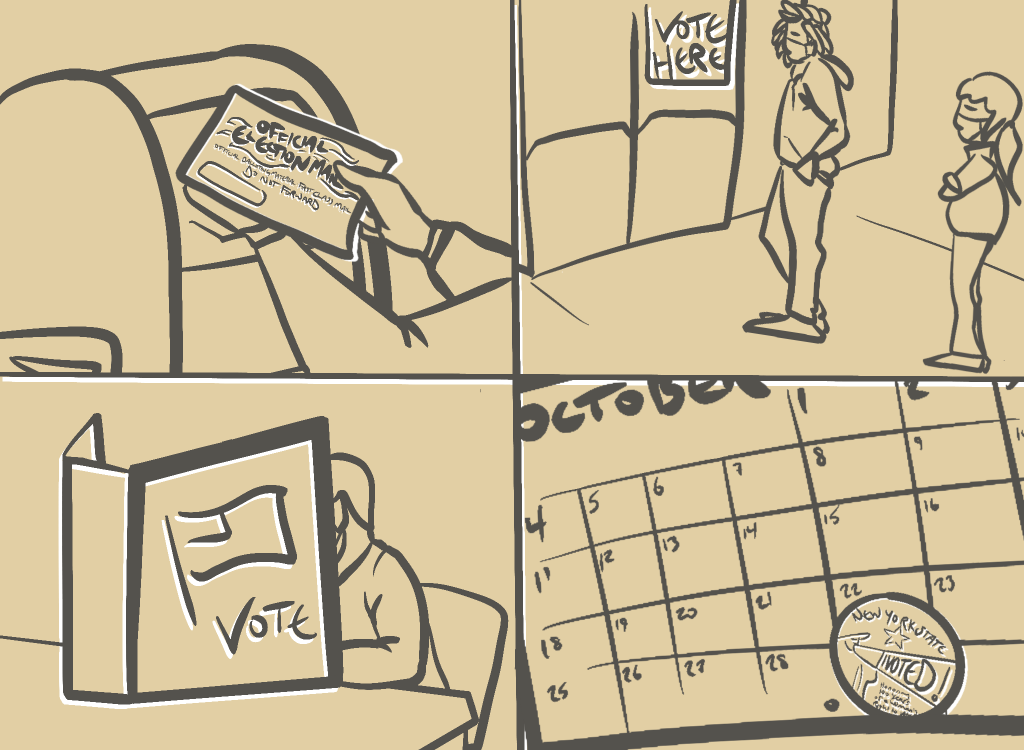Election Day is a mere five days away and for many Binghamton University students, this will be the first presidential race where they will be able to exercise their right to vote.
Unfortunately, students have yet to receive a day off from classes in order to go out in vote. Despite the Student Association (SA) approving a bill to request this Nov. 3 and future election days off, there doesn’t seem to be a change to the University schedule anytime soon. The University has cited risks due to COVID-19 and the already adjusted fall 2020 schedule as to why they intend to keep students in classes. However, there will be in-person voting available in the Events Center next Tuesday, as well as increased bussing for students. Students are encouraged, however, to petition the Faculty Senate if they want to see this change implemented.
There is a slight decrease in on-campus voting on Nov. 3 to be expected, largely due to the pandemic and the increase in voting by mail and early voting by students. Despite the challenges faced by student voters this year in particular, there has been a steady increase in voter turnout among students at BU. In 2018, there was a 23.2 percentage point increase in student voter turnout from 2014. This increase has also been sustained during “off” years, where major elections were not taking place. BU also recently hosted a “Bearcat Chat,” part of an online video series dedicated to talking about many aspects of life for students at BU during the pandemic, which discussed local early voting locations accessible to students.
There has also been a recent pattern of younger candidates, many of whom are BU alumni challenging older, more established incumbents. For example, Aviva Friedman, city councilwoman for Binghamton’s 4th district and Conrad Taylor, the former city councilman for Binghamton’s 4th district are both BU graduates. There is even a current BU student running for office. Jackson White, a junior majoring in philosophy, politics and law and the youngest candidate for the position ever, is running for Broome County legislator for the 1st district. These candidates deserve to be given a platform in which they can reach out to students and connect with those at the university they represent.
U.S. Rep. Anthony Brindisi, the current Democratic incumbent being challenged by Claudia Tenney in New York’s 22nd district — which encompasses Binghamton — recently held a virtual town hall at BU, further stressing the importance of student votes and having campaigns appealing to students. This is a small step in the right direction, and it was great that the University was able to participate in such an event.
BU, and subsequently the city of Binghamton, marks a blue dot in a usually red district, and this is seen both on and off campus. The overall theme appears to be that there are more liberal and progressive groups chartered on campus than conservative and Republican groups. The same trend can be seen in Downtown Binghamton with progressive groups like Progressive Leaders of Tomorrow (PLOT) and Citizen Action of New York, to name a few, actively organizing with students. While the Center for Civic Engagement (CCE) provides voting information for students, it needs to happen outside presidential election years and has to be upheld by local politics.
Clear outlines of candidate’s policies could be made readily available to student voters, as well as advertising any and all options available — even third-party candidates and options that rarely see the light of day in our system. These candidates shouldn’t be left out of information given to students, nor should unique voting options like voting for presidential candidates under third parties like the Working Families party. Even the candidates for “smaller” offices should be reached out to on behalf of students so that they can make the best choices.
It is no secret that, while this election in particular is so crucial and requires voter turnout, our votes count even more in local elections. There, we can be the ones choosing the sheriffs, local officials, judges and more, many of whom will have a strong impact on our community and our lives. Students must be encouraged to vote, both by local candidates running as well as the University. We’ve seen an upswing in voting and even students sticking around and getting directly involved in Binghamton politics after graduating. This must be encouraged, keeping up the momentum from political movements and activism so that we can play the biggest hand in our futures and support the communities that have always supported us.



